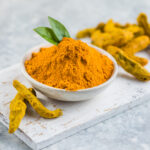Natural compound shows promise against even the deadliest forms of cancer
 (NaturalHealth365) On the website of the Centers for Disease Control and Prevention (CDC), 2019 is the latest year for which cancer incidence data are available. That same year, 599,589 people died of cancer. However, a natural compound shows strong promise against even the deadliest forms of cancer. It’s called curcumin, and it could be a major breakthrough in cancer prevention and treatment.
(NaturalHealth365) On the website of the Centers for Disease Control and Prevention (CDC), 2019 is the latest year for which cancer incidence data are available. That same year, 599,589 people died of cancer. However, a natural compound shows strong promise against even the deadliest forms of cancer. It’s called curcumin, and it could be a major breakthrough in cancer prevention and treatment.
The National Cancer Institute has tested over 1,000 compounds, and just 40 of them showed any promise. Curcumin was a leader in this group.
Nature’s powerful medicine, curcumin, derived from turmeric
Curcumin is found in high amounts in the spice turmeric. It can be extracted and concentrated, and numerous studies have shown it to have cancer-protective benefits.
In fact, there have now been hundreds of curcumin studies confirming its efficacy against cancer. These studies have looked at three main areas: using it to treat current cancers, reducing the side effects of radiation and chemotherapy, and curcumin for cancer prevention.
Curcumin shown to be effective against a range of cancers
Curcumin has been found to be particularly helpful against gastrointestinal cancers due to its slow absorption rate. This means higher levels of curcumin stay within the intestinal tract longer, allowing for more healing effects.
Colorectal cancer patients receiving 1,080 mg of curcumin per day between biopsy and surgery (10 to 30 days) showed increased dying tumor cells, lowered inflammation, improved body weight, and higher gene expression indicating cancer suppression. Another colorectal cancer study series showed all of these benefits plus reduced DNA damage and improved protective intracellular scavenging of free radicals.
Curcumin has also shown tremendous promise in addressing pancreatic cancer, one of the most lethal types. Patients given 8,000 mg of curcumin per day showed favorable changes to cancer progression markers. One person showed a reduction in tumor size by 73 percent. Another remained stable for 18 months on curcumin; these results are usually unheard of with pancreatic cancer.
Curcumin disrupts development of cancer cells without unwanted side effects
Other studies have shown curcumin’s anticancer properties against breast, prostate, ovarian, and other cancers. Curcumin was tested at amounts up to 12,000 mg per day. Curcumin has few if any, side effects and has also helped patients who do not respond to chemotherapy.
The development of cancer involves numerous phases, and all of them cause the disruption of normal cellular processes. Curcumin seems to impact all of these phases of cancer development, making it a powerful tool to ward off cancer.
In addition, curcumin slows the proliferation of cancer cells, reduces oxidative stress, supports the immune system, and blocks carcinogens from forming. It also helps to switch on apoptosis signaling, or programmed cell death, to eliminate cancer cells.
A time-tested, natural way to protect against cancer
Curcumin and turmeric have been used as natural medicines since ancient times in many cultures. These substances are highly regarded for their healing properties, and now science is proving their efficacy. Curcumin can be used on its own or combined with other therapies with impressive results for cancer treatment and prevention.
Keep in mind that concentrated doses of curcumin are required for best results in cancer treatment. Anyone with a family history of cancer should strongly consider curcumin supplementation to help with prevention. Naturally, when dealing with a cancer diagnosis, it’s best to work with a trusted integrative healthcare professional.
To learn more about how to stop cancer naturally, own the Stop Cancer Docu-Class, created by Jonathan Landsman and featuring many of the best integrative cancer specialists in the world.
Sources for this article include:



